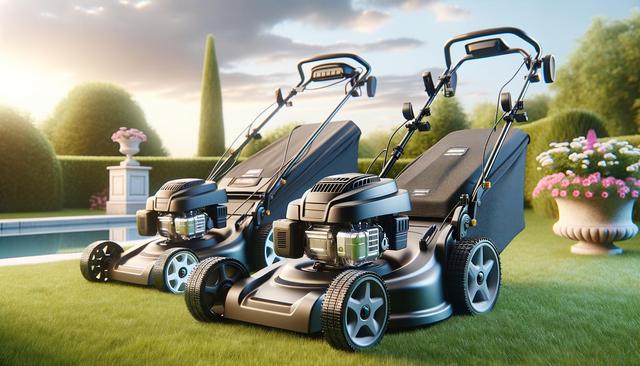Understanding the Basics of Gas and Electric Mowers
When you’re in the market for lawn mowers, one of the first decisions you’ll face is whether to go with a gas-powered or electric model. Each type has its own advantages and drawbacks, and the right choice will depend largely on your specific lawn care needs. Gas mowers have long been favored for their power and ability to handle large or uneven yards, while electric mowers have gained popularity for their ease of use, lower noise, and reduced environmental impact. Understanding the core differences can help guide your selection process.
Gas lawn mowers are typically known for their strength, making them suitable for thicker grass and longer mowing sessions. They don’t rely on a cord or battery, which means they can run as long as you have fuel. However, they tend to be heavier, noisier, and require more maintenance such as oil changes, spark plug replacements, and air filter cleaning. On the other hand, electric mowers, whether corded or battery-powered, offer quieter operation and minimal upkeep. They are easier to start—usually with the push of a button—and are lighter, making them a good fit for small to medium yards.
Key Features to Consider in Gas Lawn Mowers
When looking at gas lawn mowers for sale, it’s important to consider the features that matter most to you. Here are a few aspects to evaluate:
- Engine size: A larger engine typically means more power, which can be helpful for tough mowing conditions.
- Cutting width: A wider cutting deck allows you to mow more area in less time.
- Drive type: Self-propelled models reduce the physical effort needed, especially on sloped terrain.
- Adjustable cutting height: This allows you to customize the blade height depending on the season and grass type.
Gas mowers also tend to have a longer lifespan, provided they are properly maintained. If you’re managing a large yard or frequently encounter thick, wet grass, a gas mower may be more efficient over time, despite the higher upfront and ongoing maintenance costs.
What to Know About Electric Lawn Mowers
Electric lawn mowers are often chosen for their convenience and environmental friendliness. When browsing electric lawn mowers for sale, you’ll find options that are either corded or powered by rechargeable batteries. Battery-powered mowers offer great flexibility, allowing freedom of movement without the limitation of a power cord. However, the run time is limited to the battery capacity, which may not be ideal for larger lawns unless you have extra batteries on hand.
Corded electric mowers provide continuous power and are generally lighter and more affordable, but the cord can be restrictive and inconvenient, especially in larger spaces. Some key features to consider include:
- Battery life: Look for models with lithium-ion batteries, which tend to charge faster and last longer.
- Cutting options: Many electric mowers offer mulching, bagging, and side discharge functions.
- Compact storage: Foldable handles and smaller footprints make storage easier, especially in tight spaces.
Electric mowers produce no direct emissions and are quieter, which can be a significant benefit in noise-sensitive neighborhoods. They also require less maintenance, making them an appealing choice for those who prefer a low-hassle solution.
Cost Considerations and Long-Term Value
Price is a key factor for many homeowners, and both gas and electric mowers come in a wide range of price points. Generally, gas mowers can have a higher initial cost and require additional expenses for fuel, oil, and regular maintenance. However, they may offer greater durability and performance in demanding conditions.
Electric mowers, particularly corded models, tend to be more budget-friendly upfront and have fewer ongoing costs. Battery-powered versions may be more expensive, especially when factoring in the cost of replacement batteries over time. Still, the savings on fuel and maintenance can offset the higher initial investment in the long run.
When evaluating value, also consider:
- Lawn size and complexity: A smaller, flat yard may not require the power of a gas mower.
- Time savings: A wider cutting path or self-propelled feature may reduce the time it takes to mow.
- Environmental impact: Electric mowers offer a cleaner alternative with lower emissions and reduced noise.
Ultimately, the total cost of ownership should include both the purchase price and the ongoing expenses necessary to keep the mower running efficiently.
Making the Right Choice for Your Lawn
Deciding between gas and electric lawn mowers comes down to matching the mower’s capabilities with your lawn’s requirements. If you need a powerful machine for frequent mowing on uneven or large terrain, a gas mower may be the more practical option. For those with smaller yards who value quiet operation and ease of use, electric mowers present a compelling alternative.
Other factors to weigh include your comfort with mower maintenance, your local climate (wet grass may require more power), and your personal environmental values. For example, if reducing emissions is a priority, electric mowers provide a cleaner solution without sacrificing performance for smaller spaces.
Before purchasing, consider testing both types at a local retailer if possible, or reading owner reviews that reflect real-world usage. This can provide insight into reliability, ease of operation, and overall satisfaction. Additionally, check for warranty coverage and availability of service centers, especially for gas-powered units that may require more upkeep.
Conclusion: Choosing a Mower That Matches Your Needs
Whether you’re leaning toward a gas or electric lawn mower, the right choice depends on your lawn size, terrain, personal preferences, and willingness to handle maintenance. Gas mowers offer power and durability suited for larger, more demanding yards, while electric models provide a quieter, cleaner, and often more convenient experience for smaller properties. By evaluating your specific needs and comparing available features, you can make a well-informed decision that leads to a smoother and more enjoyable lawn care routine.






